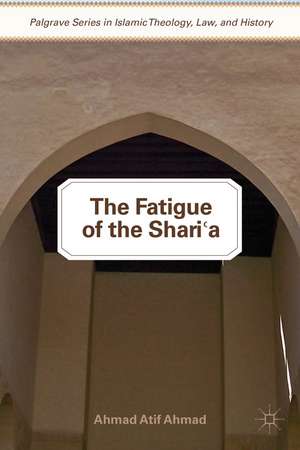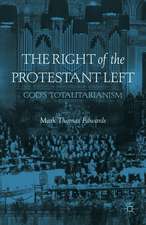The Fatigue of the Shari‘a: Palgrave Series in Islamic Theology, Law, and History
Autor A. Ahmaden Limba Engleză Hardback – 27 mar 2012
| Toate formatele și edițiile | Preț | Express |
|---|---|---|
| Paperback (1) | 381.59 lei 6-8 săpt. | |
| Palgrave Macmillan US – 27 mar 2012 | 381.59 lei 6-8 săpt. | |
| Hardback (1) | 387.38 lei 6-8 săpt. | |
| Palgrave Macmillan US – 27 mar 2012 | 387.38 lei 6-8 săpt. |
Preț: 387.38 lei
Nou
Puncte Express: 581
Preț estimativ în valută:
74.12€ • 77.39$ • 61.35£
74.12€ • 77.39$ • 61.35£
Carte tipărită la comandă
Livrare economică 04-18 aprilie
Preluare comenzi: 021 569.72.76
Specificații
ISBN-13: 9780230340367
ISBN-10: 0230340369
Pagini: 208
Ilustrații: XIII, 208 p. 2 illus.
Dimensiuni: 140 x 216 x 18 mm
Greutate: 0.4 kg
Ediția:2012
Editura: Palgrave Macmillan US
Colecția Palgrave Macmillan
Seria Palgrave Series in Islamic Theology, Law, and History
Locul publicării:New York, United States
ISBN-10: 0230340369
Pagini: 208
Ilustrații: XIII, 208 p. 2 illus.
Dimensiuni: 140 x 216 x 18 mm
Greutate: 0.4 kg
Ediția:2012
Editura: Palgrave Macmillan US
Colecția Palgrave Macmillan
Seria Palgrave Series in Islamic Theology, Law, and History
Locul publicării:New York, United States
Cuprins
Introduction PART I: FOUNDATIONS Truth and Fatigue The Fatigue of the Shari'a: A Modern Commentary A Note on the Term 'Futur al-Shari'a' Inquiries and Tools Open Questions Transformations and Vacuum in Complex Systems Reason Unaided by Revelation Revelations before and after Muhammad Vacuum in Divine Norms The Fatigue of the Shari'a Lacunae in Actual Shari'a Models Political Science and Jurisprudence Two Arguments for the Fatigue of the Shari'a Today Ijtihad Theory The Judgment from Outside Forgetting the Foundation Ijtihad and the Madhhab Relativity in Ijtihad and the Fatigue of the Shari'a PART II: JURISTS AND NON-JURISTS Suppose we Forgot the Law Reason, Ijtihad; Reward & Punishment God's Duties and Those of Humans The Mu'tazili Position Ibn Rushd (d. 595/1198) Law's Life in Potentiality The End of Jurisprudence Juwayni (d. 478/1085) on the Extinction of Jurisprudence The Argument against Reason's Unqualified Sovereignty The Survival of the Truth and the Survival of Scholars A Matter of Profession—an Academic Turf? Ijtihad for All Dissent for or against Reason Before all Revelations What Conditio Sine Qua Non? Ibn Taymiyya's (d. 728/1328) Attacks on Reconciling Reason with Revelation The Hanabila's Recruits Ibn al-Najjar (d. 972/1564) Pessimistic, Optimistic? Ijtihad for All in the Islamic 15th Hundred PART III: MODERNITY AND ITS QUESTIONS A New Picture Modern Reform of the Shari'a Revisited Reservations Ijtihad and Tajdid Reform in Religion and in Law Structure Chronology Questions Old and New A Second Phase of the Debate Lasting Impact? Accepting Second-Class Status Parameters of Health and Frailty Multiple Dialectics Four Eras of Islamic Legal History Abesnt Good Government Juwayni's (419/1028-478/1085) Classic on Government Absent Good Government A Synopsis from the Ghiyathi Law and State Skin-deep Government Discrepancy between Local Law and World System PART IV: BEYOND MODERNITY Neglected Knowledge Knowledge and Disagreement Valid Positions Deferring tothe Opponent Knowledge and Ignornce The Shari'a and the Laws of Nature Hurdles to Overcome before considering the Shari'a as Lost Knowledge Constant Interpretation Fatigue of Different Types The Search for a Trap Conclusion Postscript: After the Law; Shari'a as History
Recenzii
"In the past, leading scholars of Islam debated whether humanity could ever lose the kind of divine guidance they received in the revelation of the Qur'an and in the Shari'a. In this insightful and intriguing monograph, Ahmad A. Ahmad documents and analyzes these debates, and he shows why that question is particularly important today and how it can be answered." - Frank Griffel, Professor of Islamic Studies, Yale University
"An engaged and interesting account of the ongoing debate - begun in the medieval era - as to whether the Shari'a will survive until the end of time, Ahmad's book tackles also other significant topics, including the unaided ability of the human intellect to arrive at binding norms. As such, the discussion bears important implications for modern Muslim societies, particularly those which are changing." - Georges Tamer, M. S. Sofia Chair in Arabic Studies,
Near Eastern Languages and Cultures, The Ohio State University
"An engaged and interesting account of the ongoing debate - begun in the medieval era - as to whether the Shari'a will survive until the end of time, Ahmad's book tackles also other significant topics, including the unaided ability of the human intellect to arrive at binding norms. As such, the discussion bears important implications for modern Muslim societies, particularly those which are changing." - Georges Tamer, M. S. Sofia Chair in Arabic Studies,
Near Eastern Languages and Cultures, The Ohio State University
Notă biografică
AHMAD ATIF AHMADIS Associate Professor of Religious Studies at the University of California in Santa Barbara, USA.


























